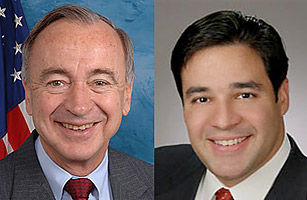
Idaho Democratic candidate Walt Minnick, left, and Republican candidate Raul Labrador
As the prospects for Democrats in this year's midterm elections get dimmer by the day, party leaders are eagerly watching the performance of Walt Minnick. The freshman member from Idaho's 1st Congressional District is crafting a blueprint for how Democrats in conservative districts can withstand the electoral wave that threatens to sweep the party out of power. Minnick, one of the House's moderate so-called Blue Dogs, is coasting ahead of Republican opponent Raul Labrador in his bid to keep one of the nation's reddest districts in Democratic hands. A September survey taken by local television stations found Minnick lapping Labrador, 60% to 30%. It won't be easy for Labrador to close the yawning chasm between the two candidates. He had just $69,000 on hand at the end of June, a figure dwarfed by Minnick's $1.1 million.
How did a first-term Democrat build a big lead in a staunchly conservative district? It helps that Minnick, 67, is the lower chamber's biggest maverick. He has voted against his party more often than any other House member, hewing to the Democratic line only about 70% of the time. Several of those votes were the ones Republicans have dangled as a sign of the disconnect between the Democrats and the nation's prevailing mood — including the votes on the stimulus bill and health care reform. By bucking his party on the linchpins of its agenda, Minnick became the first — and only — Democrat to nab an endorsement from the Tea Party Express, a political action committee that anointed him one of its "heroes." Minnick subsequently spurned the Tea Party Express in the wake of odious comments from one of its leaders, but that doesn't mean he has squandered his support within the movement. "In terms of fiscal conservatism and smaller government, I line up very well with most of the folks that associate with the Tea Party," Minnick said during an interview on CNN in April.
A Harvard Business School grad who helped form the Drug Enforcement Administration while serving in the Nixon Administration before becoming CEO of an Idaho-based forestry company, Minnick has also introduced a measure that would permanently ban all earmarks and sponsored a constitutional amendment to balance the budget. This brand of fiscal restraint plays well with powerful interest groups across the aisle, earning Minnick the support of the U.S. Chamber of Commerce and a perfect mark on the conservative Club for Growth's pork-barrel scorecard. "His voting record is hard to go after," Idaho's other House member, Republican Mike Simpson, told Fox News. In a measure of the hammerlock Minnick has put on the race, the Republican Party has reassigned one of the two staffers hired to help Labrador, 42, and the party hasn't waded into the contest with splashy ad buys.
Labrador, however, has erased sizable deficits before. He became the GOP nominee by upsetting party-establishment favorite Vaughn Ward, a Marine and former CIA officer who had the backing of Sarah Palin and was dubbed one of the National Republican Campaign Committee's "Young Guns." Labrador, who campaigned on a promise to defy the Democratic agenda, has run hard to Minnick's right. He favors withdrawing from the U.N., a return to the gold standard and a repeal of the 17th Amendment, which provides for the direct election of U.S. Senators. "We the people should tell the government what to do, not the other way around," he told an appreciative crowd at Idaho's Lake Lowell in August.
To further distinguish himself, Labrador proudly notes that as a member of the Idaho state legislature — hardly a liberal bunch — he stood out as an "extreme conservative." That may be an asset in western Idaho, where John McCain clobbered Barack Obama in 2008 and where Minnick's narrow victory in 2008 flipped the seat for the first time since 1992. Facing a popular incumbent with a conservative voting record, Labrador has played up Minnick's connection to Democratic figureheads such as Obama and House Speaker Nancy Pelosi, who are deeply unpopular there. On his Facebook page, the GOP nominee is hawking "Fire Pelosi" T-shirts and soliciting donations by telling supporters their money will "send a message" to Obama and Pelosi as well as Minnick. Guilt by association will surely be a persuasive case for some voters, but it may not be enough to keep Minnick from a second term.